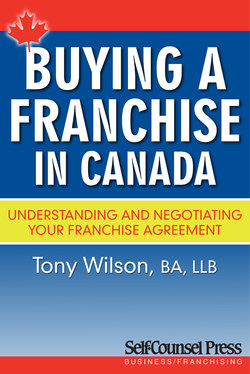Читать книгу Buying a Franchise in Canada - Tony Wilson - Страница 7
На сайте Литреса книга снята с продажи.
1. What Is Franchising?
ОглавлениеFranchising, or as we sometimes call it, “business format franchising,” can be defined as an ongoing contractual relationship between the franchisor on the one hand and the franchisee on the other. Under the franchise agreement, the franchisor grants the franchisee the licensed right for a period of time to —
• market a product or service;
• use the franchisor’s trade-mark and business system; and
• use the franchisor’s “know-how” in the operation of the business.
In exchange, the franchisee is required to —
• conform to the franchisor’s business system, methods, and procedures;
• maintain the franchisor’s quality standards; and
• pay a fee to the franchisor (which is usually an initial franchise fee and a continuing monthly or weekly royalty).
The franchisor is the entity that grants franchise rights to the franchisee. Although a franchise agreement is different than a lease, you might think of it in lease-like terms in which a “landlord” leases space in a building to the “tenant” for a period of time under a “lease.” In exchange for this right to use the space, the tenant pays the landlord “rent.” When the lease expires or is terminated, the tenant no longer has the right to use the space. During the term of the lease, the tenant must comply with the provisions of the lease and the rules and regulations under it.
Franchising is not entirely similar, but it’s similar enough for our purposes. Instead of the franchisor granting you the right to rent space, the franchisor is granting you the right to use its business system and its trade-mark. In exchange, you agree to pay the franchisor a fee — normally an initial franchise fee and an ongoing royalty based upon a percentage of the gross sales generated by your franchised business. In addition to the initial franchise fee and royalties for the use of the franchisor’s business system, you must also comply with the franchise agreement and with the franchisor’s operating procedures, which is normally set out in its operations manual. Strictly speaking, you don’t “buy” the franchise. You acquire the licensed rights to use the franchisor’s business system and trade-mark for a period of time. When those licensed rights have expired or are terminated, they revert back to the franchisor. The franchisor can, if it so chooses, license the franchise rights to somebody else.
You can see business format franchising in action virtually everywhere (e.g., restaurants, hotels, real estate companies, travel agencies, convenience stores, printing stores, camera stores, tax preparation outlets, cash advance outlets, muffler shops, fast food outlets, and, believe it or not, law firms). All you have to do is visit your local shopping centre or strip mall to see how prevalent franchising has become. In one form or another, you’re surrounded by franchises. In 2004, franchised businesses accounted for the employment of at least 1,000,000 Canadians, so even if you don’t particularly like fast food outlets in your local mall, or relish the thought of yet another muffler shop down the road, you must realize that it’s a phenomenally important segment of our economy. Our standard of living is in part based on the vibrancy of this industry and its ability to create opportunities, livelihoods, and jobs for others.
It must also be remembered that franchising is, more than anything else, a means of business expansion, using capital obtained from the franchisee to fund expansion. (The cynics among us have an acronym for this. It’s called OPM and it stands for Other People’s Money.) The franchisor’s business is being expanded not only through the franchisee’s efforts but also due to direct and indirect contributions of money by the franchisee. It has been said that companies that do not need to franchise (because they have the capital necessary to finance expansion), don’t. (Starbucks is an example of one of the companies that don’t need to franchise.)
For a hundred different reasons, franchising works well. But it doesn’t always work, and it’s important for all prospective franchisees to realize that.
